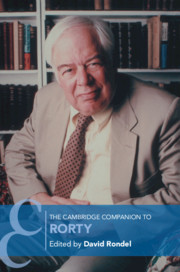Book contents
- The Cambridge Companion to Rorty
- Cambridge Companions to Philosophy
- The Cambridge Companion to Rorty
- Copyright page
- Contents
- Contributors
- Abbreviations of Works by Rorty
- Introduction: The Unity of Richard Rorty’s Philosophy
- 1 Rorty’s Metaphilosophy: A Pluralistic Corridor
- 2 After Metaphysics: Eliminativism and the Protreptic Dilemma
- 3 Rorty and Classical Pragmatism
- 4 A Pragmatism More Ironic Than Pragmatic
- 5 Rorty and Semantic Minimalism
- 6 Returning to the Particular: Morality and the Self after Rorty
- 7 Rorty’s Political Philosophy
- 8 Tinkering with Truth, Tinkering with Difference: Rorty and (Liberal) Feminism
- 9 Rorty’s Insouciant Social Thought
- 10 Rorty and National Pride
- 11 Rorty on Religion
- 12 Rorty: Reading Continental Philosophy
- 13 Rorty’s Literary Culture: Reading, Redemption, and The Heart’s Invisible Furies
- 14 Wild Orchids
- Bibliography
- Index
- Cambridge Companions to Philosophy
8 - Tinkering with Truth, Tinkering with Difference: Rorty and (Liberal) Feminism
Published online by Cambridge University Press: 13 April 2021
- The Cambridge Companion to Rorty
- Cambridge Companions to Philosophy
- The Cambridge Companion to Rorty
- Copyright page
- Contents
- Contributors
- Abbreviations of Works by Rorty
- Introduction: The Unity of Richard Rorty’s Philosophy
- 1 Rorty’s Metaphilosophy: A Pluralistic Corridor
- 2 After Metaphysics: Eliminativism and the Protreptic Dilemma
- 3 Rorty and Classical Pragmatism
- 4 A Pragmatism More Ironic Than Pragmatic
- 5 Rorty and Semantic Minimalism
- 6 Returning to the Particular: Morality and the Self after Rorty
- 7 Rorty’s Political Philosophy
- 8 Tinkering with Truth, Tinkering with Difference: Rorty and (Liberal) Feminism
- 9 Rorty’s Insouciant Social Thought
- 10 Rorty and National Pride
- 11 Rorty on Religion
- 12 Rorty: Reading Continental Philosophy
- 13 Rorty’s Literary Culture: Reading, Redemption, and The Heart’s Invisible Furies
- 14 Wild Orchids
- Bibliography
- Index
- Cambridge Companions to Philosophy
Summary
In “Globalization, the Politics of Identity, and Social Hope,” Rorty presents a pair of claims: tinkering with the concepts of “identity” and “difference” cannot be made politically useful, but tinkering with the concepts of “rationality” and “truth” can be made politically useful. In this chapter, I use this pair of claims to explain Rorty’s reasons for thinking that leftist critics of his liberalism fail to recognize that they are themselves part of the liberal “we” to which he regularly refers. When Rorty claims that tinkering with rationality and truth can be made politically useful, he has in mind the anti-authoritarian idea that moving from philosophy to redescription makes room for social progress. When he claims that tinkering with “identity” and “difference” cannot be made politically useful, he is making two points: the politics of identity as a philosophical program is overly theoretical and overly pessimistic, but the politics of identity as a political project is nothing other than good old-fashioned liberalism. Together, these claims leave leftist philosophers and activists in a position where we cannot radically undermine liberalism, but where we can work to gradually reform it.
Keywords
- Type
- Chapter
- Information
- The Cambridge Companion to Rorty , pp. 179 - 200Publisher: Cambridge University PressPrint publication year: 2021
- 2
- Cited by



